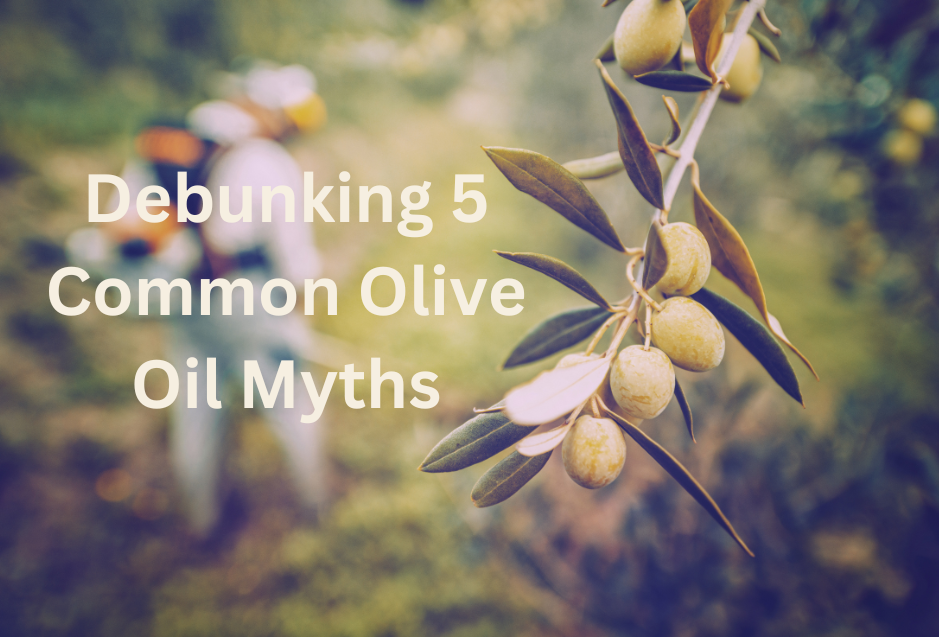Olive oil, celebrated for its flavor and health benefits, often falls victim to a host of misconceptions that can confuse even the most discerning shoppers.
From myths about its cooking uses to misconceptions about aging and origin, it’s time to set the record straight.
Whether you're a culinary professional or a home cook, understanding the facts about olive oil can elevate your cooking and ensure you’re getting the best product for your needs.
In this post, we'll debunk five prevalent myths about olive oil, helping you to make informed choices that bring out the best in your dishes.
Myth: Olive oil is not good for cooking
Clarification: This is a common misconception! The truth is that the quality of olive oil matters significantly when it comes to cooking.
High-quality olive oils, like your client's award-winning varieties, often have higher smoke points due to lower acidity and a higher level of antioxidants.
The smoke point of high-quality olive oil can vary depending on its type and how it is processed.
For high-quality extra virgin olive oils, the smoke point generally ranges from about 375°F to 410°F (190°C to 210°C).
This makes them excellent for a variety of cooking methods, including sautéing, roasting, and even some forms of frying.
It's important for consumers to check the type and quality of olive oil to ensure it suits their cooking needs.
Myth: Olive oil needs to be aged like wine
Clarification: Unlike wine, olive oil does not improve with age. Freshness is key to its quality and flavor.
The best olive oil is consumed within a year or two of harvest, as it can start to lose its unique flavors and health benefits over time.
Look for harvest dates on labels to ensure you are getting the freshest oil possible.
Myth: Olive oil has to be from Italy
Clarification: Italy is renowned for its olive oil, but excellent olive oils are produced in many other countries, including Spain, Greece, Portugal, and even the United States.
The quality and characteristics of olive oil depend more on the type of olives used, the growing conditions, and the production methods rather than just the country of origin.
Explore different regions and varieties to discover the diverse flavors and profiles of olive oil.
Myth: The cheaper the olive oil, the lower the quality
Clarification: Price can sometimes be an indicator of quality, but it's not an absolute rule.
While high-quality olive oils often come at a premium due to the care taken in cultivation and processing, not all inexpensive oils are of low quality.
Factors like production scale, subsidies, and regional economic conditions can also influence price.
You should look beyond price and evaluate olive oil based on its origin, harvest date, and certifications.
Sometimes, smaller or less well-known brands can offer excellent quality at more competitive prices as they strive to establish themselves in the market.
Myth: If it doesn't say 'cold-pressed' on the label, it's not extra virgin olive oil
Clarification: The term 'cold-pressed' means that the oil was extracted without heat above a certain temperature, preserving its quality.
However, many high-quality extra virgin olive oils may not specifically mention 'cold-pressed' but can use terms like 'cold-extracted' or may not specify the method at all on the label.
For oils with the California Olive Oil Council (COOC) seal, for example, there is an assurance of quality and adherence to specific standards, including that the extraction process does not involve heat.
This certification confirms that the oils are indeed extracted in a way that preserves the integrity and purity of the olive oil, similar to cold-pressing.
Consumers should trust these certifications as they indicate adherence to strict quality and processing standards, which are often more informative than the specific terms used on labels.
All our award-winning and premium oils all have the COOC Seal. This ensures you are getting high quality extra virgin olive oils!
Embrace the Full Potential of Olive Oil
Now that we've cleared up some common misconceptions, you’re better equipped to choose and use olive oil with confidence.
Remember, the key to unlocking the rich flavors and health benefits of olive oil lies in understanding its qualities and origins.
Don't let myths deter you from enjoying one of the culinary world's most versatile ingredients.
Whether you're drizzling, cooking, or dressing, the right olive oil can make all the difference in your dishes.

